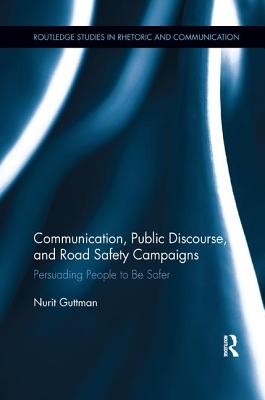
- We will send in 10–14 business days.
- Author: Nurit Guttman
- Publisher: Routledge
- ISBN-10: 1138710237
- ISBN-13: 9781138710238
- Format: 15.2 x 22.9 x 1.7 cm, minkšti viršeliai
- Language: English
- SAVE -10% with code: EXTRA
Communication, Public Discourse, and Road Safety Campaigns (e-book) (used book) | bookbook.eu
Reviews
Description
This book discusses the use of communication campaigns to promote road safety, arguing that they need to elicit public discourse on issues pertaining to culture, equity, gender, workplace norms, environmental issues, and social solidarity. Increasingly, new media channels and formats are employed in the dissemination process, making road safety-related messages ubiquitous, and often controversial. Policy makers, educators, researchers, and the public continue to debate the utility and morality of some of the influence tactics employed in these messages, such as the use of graphic images of injury or death, stigmatization (or "blame and shame"), and the use of "black humor." Guttman argues that influencing road safety requires making changes in normative and cultural conceptions of broader issues in society, yet the typical discourse on road safety tends to focus on individual attitudes and practices. The book highlights the importance of social and behavioral theory in communication campaigns on road safety, and critiques the tendency to focus on individual cognition, affect, and risk conceptions rather than on normative, structural, and cultural factors. The volume positions the discourse on road safety as a social issue, and treats road safety behavior as a social activity that directly relates to other public issues, social values, and social policy, while discussing potential uses of social media and participatory approaches. The discussion turns to the role of road safety communication campaigns as part of a democratic process of eliciting public discourse, including how contemporary society could address broader issues of risk and safety.
EXTRA 10 % discount with code: EXTRA
The promotion ends in 21d.02:49:01
The discount code is valid when purchasing from 10 €. Discounts do not stack.
- Author: Nurit Guttman
- Publisher: Routledge
- ISBN-10: 1138710237
- ISBN-13: 9781138710238
- Format: 15.2 x 22.9 x 1.7 cm, minkšti viršeliai
- Language: English English
This book discusses the use of communication campaigns to promote road safety, arguing that they need to elicit public discourse on issues pertaining to culture, equity, gender, workplace norms, environmental issues, and social solidarity. Increasingly, new media channels and formats are employed in the dissemination process, making road safety-related messages ubiquitous, and often controversial. Policy makers, educators, researchers, and the public continue to debate the utility and morality of some of the influence tactics employed in these messages, such as the use of graphic images of injury or death, stigmatization (or "blame and shame"), and the use of "black humor." Guttman argues that influencing road safety requires making changes in normative and cultural conceptions of broader issues in society, yet the typical discourse on road safety tends to focus on individual attitudes and practices. The book highlights the importance of social and behavioral theory in communication campaigns on road safety, and critiques the tendency to focus on individual cognition, affect, and risk conceptions rather than on normative, structural, and cultural factors. The volume positions the discourse on road safety as a social issue, and treats road safety behavior as a social activity that directly relates to other public issues, social values, and social policy, while discussing potential uses of social media and participatory approaches. The discussion turns to the role of road safety communication campaigns as part of a democratic process of eliciting public discourse, including how contemporary society could address broader issues of risk and safety.


Reviews